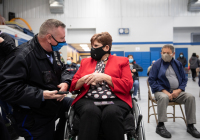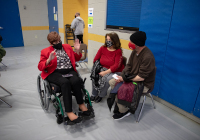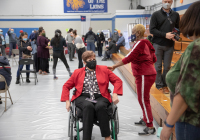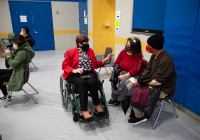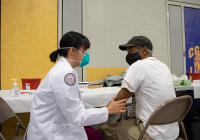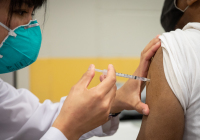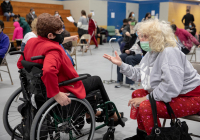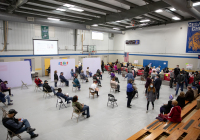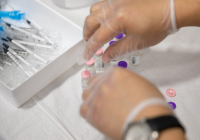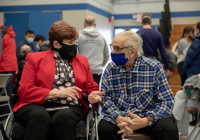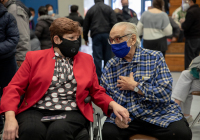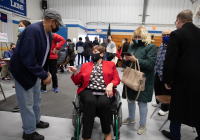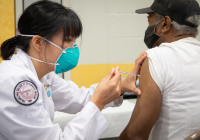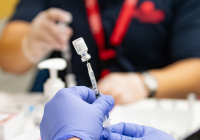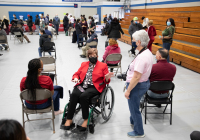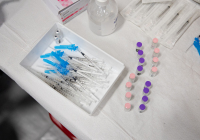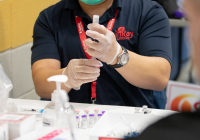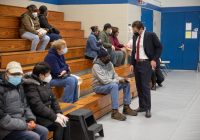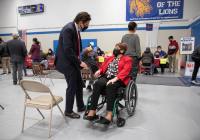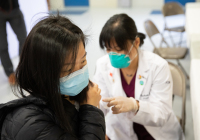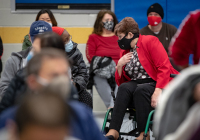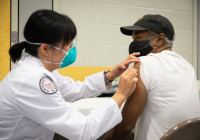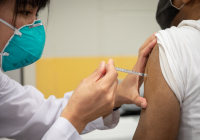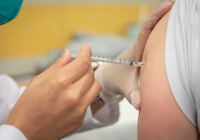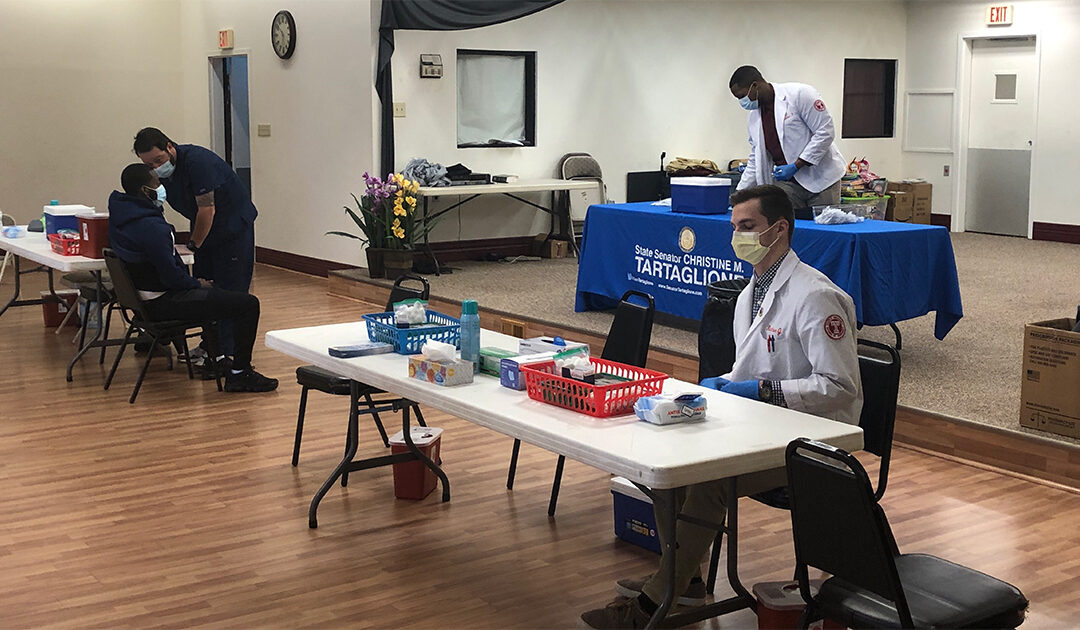
by Christin Brown | April 23, 2021 | News Releases
Philadelphia, PA – April 23, 2021 – State Senator Christine Tartaglione (D-Philadelphia) welcomed hundreds of constituents to The Baptist Worship Center in Northeast Philadelphia’s Frankford neighborhood today for a free pop-up COVID-19 Vaccination Clinic. The senator partnered with the Center and Lehigh Pharmacy to organize and manage the one-day event in the city’s Frankford neighborhood.
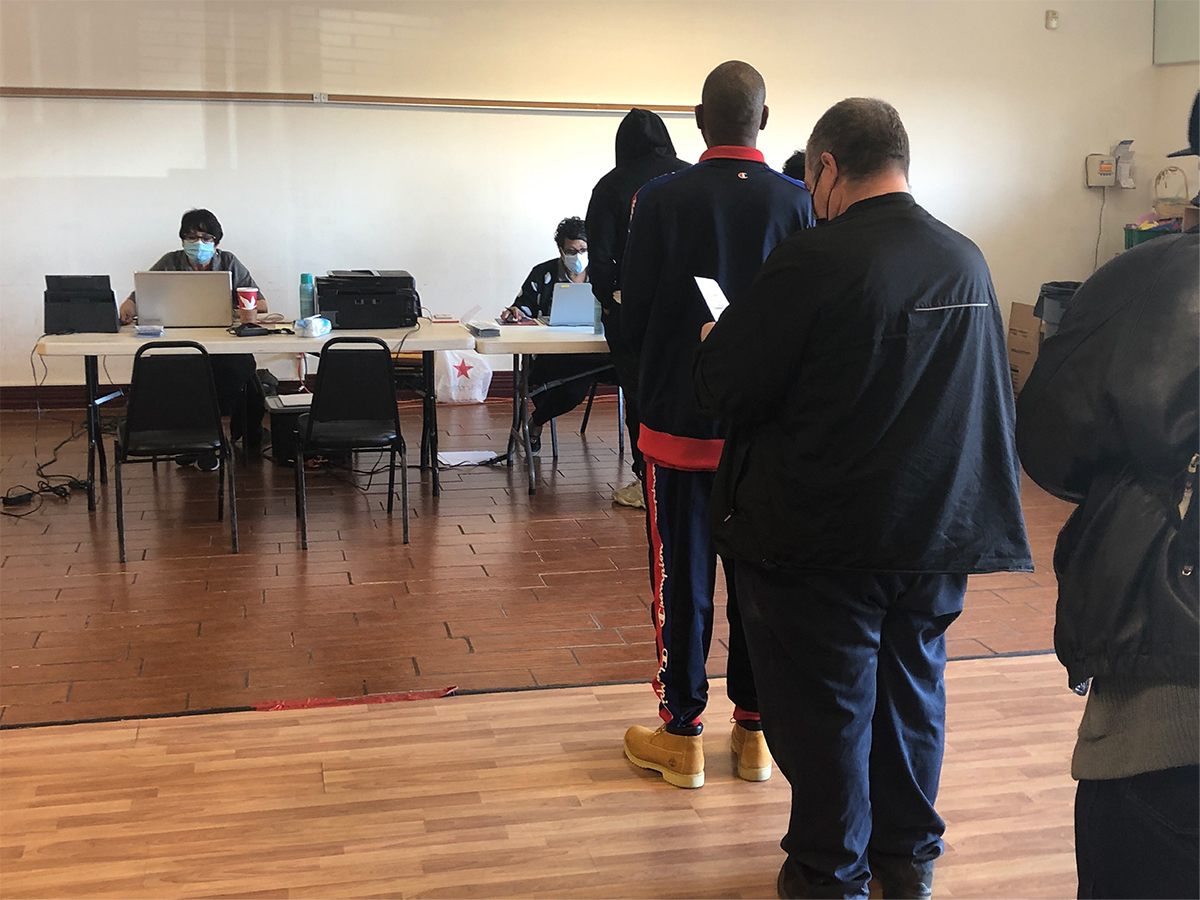 “Americans continue to get vaccinated in record numbers, but many folks and many communities remain underserved due to a variety of factors. Our goal today was to make it easy and convenient for residents of areas that have been hardest-hit by the pandemic to receive the medical care they deserve,” Senator Tartaglione said. “I thank Lehigh Pharmacy and The Baptist Worship Center for making this event possible.”
“Americans continue to get vaccinated in record numbers, but many folks and many communities remain underserved due to a variety of factors. Our goal today was to make it easy and convenient for residents of areas that have been hardest-hit by the pandemic to receive the medical care they deserve,” Senator Tartaglione said. “I thank Lehigh Pharmacy and The Baptist Worship Center for making this event possible.”
Senator Tartaglione’s 2nd District spans portions of Northeast Philadelphia, Juniata, Kensington, and North Philadelphia. The city’s Department of Public Health has classified many communities in the district as high-risk for COVID exposure and has sought to increase vaccination rates in those communities.
“Many people in the 2nd District and throughout Philadelphia may have difficulty traveling to a vaccine clinic due to mobility or transportation challenges,” Senator Tartaglione said. “Others may have trouble identifying a vaccination location due to the digital divide. And some folks are reluctant to get a vaccine because they are concerned about side effects. I want to assure everyone that vaccines are safe, and I will do everything I can to help people get vaccinated.”
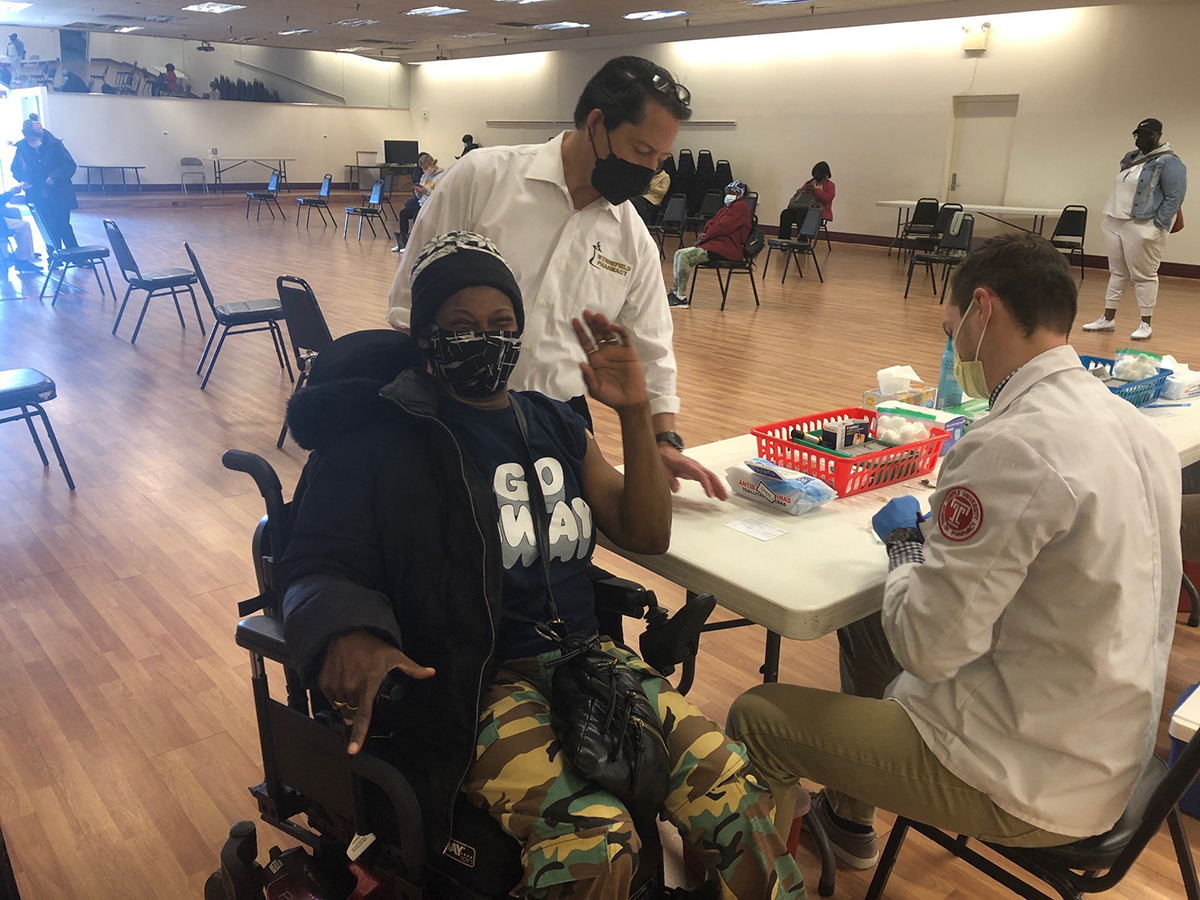 Lehigh Pharmacy, an independent pharmacy at 1006 W. Lehigh Ave. in North Philadelphia, administered all vaccinations by appointment in accordance with the latest city and state eligibility policies, as well as COVID mitigation guidance provided by the Centers for Disease Control. Vaccines are now available to anyone 16 or older. Contact Lehigh Pharmacy at 215-225-7522 for information about getting vaccinated.
Lehigh Pharmacy, an independent pharmacy at 1006 W. Lehigh Ave. in North Philadelphia, administered all vaccinations by appointment in accordance with the latest city and state eligibility policies, as well as COVID mitigation guidance provided by the Centers for Disease Control. Vaccines are now available to anyone 16 or older. Contact Lehigh Pharmacy at 215-225-7522 for information about getting vaccinated.
Contact Senator Tartaglione’s office at 215-533-0440 or 215-291-4653 for help finding a vaccination location or securing transportation to your vaccine appointment.
# # #
If you would like more information about this topic, please contact William Kenny at 215-533-0440 or William.Kenny@pasenate.com.
by Christin Brown | April 1, 2021 | News Releases
Philadelphia, PA – April 1, 2021 − State Senator Christine Tartaglione (D-Philadelphia) welcomed hundreds of constituents to Cedar Grove Academy in Northeast Philadelphia today for a free pop-up COVID-19 Vaccination Clinic. The senator partnered with state Rep. Jared Solomon (D-Philadelphia) and SunRay Drugs to organize and manage the one-day event in the city’s Lawncrest neighborhood.
“I am extremely pleased that we were able to deliver much-needed virus protection to the people of the 2nd Senate District and beyond,” Senator Tartaglione said. “Our goal is to make vaccination available and convenient for all eligible residents of the city. We achieved that today and will continue to work to improve vaccine access.”
Senator Tartaglione’s 2nd District spans portions of Northeast Philadelphia, Juniata, Kensington, and North Philadelphia. The city’s Department of Public Health has classified many communities in the district as high-risk for COVID exposure and has sought to increase vaccination rates in those communities.
SunRay Drugs, an independent chain of pharmacies with 25 locations in Pennsylvania and New Jersey, administered all vaccinations by appointment in accordance with Department of Public Health eligibility policy. Vaccines were available to individuals 65 and older, as well as those who qualify as Phase 1A or 1B by virtue of high-risk employment or medical conditions. A full explanation of current eligibility conditions in the city is posted on the Department’s website. These conditions apply only to Philadelphia. All other Pennsylvania counties are subject to guidance from the state’s Department of Health.
Individuals who were unable to attend today’s pop-up clinic and have not been vaccinated may call Senator Tartaglione’s office at 215-533-0440 or 215-291-4653 to sign up for a waiting list for a future pop-up clinic. The senator’s office will contact you when details are available.
Separately, Philadelphia residents are encouraged to complete the city’s Vaccine Interest Form online to become eligible for service at a city-operated clinic.
# # #
If you would like more information about this topic, please contact William Kenny at 215-533-0440 or William.Kenny@pasenate.com.

by Christin Brown | December 23, 2020 | News Releases
The Senator urged her General Assembly colleagues to authorize grants to small businesses that have been adversely affected by the pandemic.
Philadelphia, PA – December 23, 2020 – State Senator Christine Tartaglione (D-Philadelphia) applauded today’s announcement by Governor Tom Wolf of his intent to transfer $145 million from the state’s Workers’ Compensation Security Fund into the General Fund so that they may be reallocated for pandemic-related small business relief. Senator Tartaglione also urged her General Assembly colleagues to grant the legislative authorization required to appropriate the funds as grants to small businesses adversely affected by the pandemic.
“I have said throughout the COVID-19 pandemic that we must strive to protect the financial health of workers and their families in addition to their physical health,” Senator Tartaglione said. “The preservation of small businesses such as restaurants and taverns, gyms, and independent entertainment venues, which employed some 2.5 million Pennsylvanians prior to the pandemic, is vital to protecting these jobs.”
In addition to the legislative authorization requirement, the transfer carries a requirement that the Workers’ Compensation Security Fund be reimbursed the full $145 million on a later date. Since the start of the pandemic (March 11th), the Pennsylvania Department of Labor & Industry has received 12,926 new workers’ compensation claims. In 2019, the Department reported 10,071 total claim petitions.
The Pennsylvania Senate Democratic Caucus prioritized a new round of pandemic relief funding for small businesses in their initial PA CARES proposal issued in October, which included $575 million in assistance for bars, taverns, and restaurants; barbers, salons, and the personal care industry; tourism; Main Street and historically disadvantaged businesses; and nonprofit organizations. The Republican-led General Assembly took no action on this proposal and instead used $1.3 billion in remaining federal CARES Act funding to balance the state budget.
Earlier this month, Senate Democrats introduced a new $4 billion PA CARES 21 plan, which includes $800 million in relief for small businesses, with $300 million exclusively for restaurants, taverns, and others in the hospitality industry.
“These businesses are taking on massive debts just to keep their lights on and keep enough staff in place to prepare for the day when they can start rebuilding their businesses again,” Senator Tartaglione said. “They are doing everything they can to improve health protections for patrons and staff. We have an obligation to make them whole.”
For more information about the PA CARES 21 proposal, visit www.pasenate.com/pacares.
# # #
If you would like more information about this topic, please contact William Kenny at 215-533-0440 or William.Kenny@pasenate.com.

by Christin Brown | October 7, 2020 | News Releases
To date 258 local business have received or will soon receive $4.5 million in grants through the Statewide Small Business Assistance program.
Philadelphia, PA – October 7, 2020 – State Senator Christine Tartaglione today announced that 258 small businesses in and around the 2nd Senate District have received or will soon receive a combined $4.5 million in COVID-19 relief funding through Statewide Small Business Assistance (SBA), a $225 million program created by the General Assembly in May through its comprehensive PA CARES legislation.
These local businesses spanning portions of North and Northeast Philadelphia are among about 900 citywide and more than 4,100 across the state that have received grants ranging from $5,000 to $50,000 or have completed a verification process that will enable them to obtain their approved funding imminently.
“Pennsylvania businesses and their employees have worked very hard and made many sacrifices that have enabled the Commonwealth to reduce the spread of COVID-19,” Senator Tartaglione said. “As they continue their difficult reopening process, it is crucial that we provide them with resources to catch up financially and to operate safely moving forward.”
In all, more than 10,000 Pennsylvania businesses have received preliminary approval for a combined $192 million in grants through two rounds of SBA funding. Businesses in all 67 Pennsylvania counties have been approved. In Philadelphia, about 1,200 businesses have received preliminary approval. Additional verifications will be announced as they occur.
As adopted by the General Assembly and implemented by the administration of Governor Tom Wolf, the SBA program prioritized applicant businesses owned by low- or moderate-income individuals; those owned by women or minorities; those in communities with relatively high poverty rates, low median incomes, high unemployment rates, and high population loss; those in designated revitalization areas; those in rural areas; and those operating in business sectors most-impacted by the pandemic.
The program is being administered through 17 nonprofit Community Development Financial Institutions (CDFIs) that have been certified by the Commonwealth and whose primary activity is providing financing options for small businesses.
As of October 4, $76.8 million in SBA grants had been distributed or received final approval for distribution statewide, while $16 million had been distributed or received final approval for distribution in Philadelphia.
For more information about the program and a listing of the verified grant recipients, visit https://pabusinessgrants.com/
# # #
If you would like more information about this topic, please contact William Kenny at 215-533-0440 or William.Kenny@pasenate.com.

by Christin Brown | September 15, 2020 | News Releases
Additional SBA grants will be distributed in the coming weeks as part of a $225 million COVID-19 relief program created by the Pennsylvania General Assembly in May.
Philadelphia, PA – September 15, 2020 – State Senator Christine Tartaglione today announced that 183 small businesses in and around the 2nd Senate District have received or will soon receive a combined $3,050,000 in COVID-19 relief funding from the Commonwealth as part of Pennsylvania Statewide Small Business Assistance, a $225 million program created in the comprehensive PA CARES legislation adopted by the General Assembly in May.
These local businesses are among 647 in Philadelphia and more than 3,000 statewide that have completed all required financial verifications and accepted the terms of the grant program in writing. In all, approximately 5,000 Pennsylvania businesses, including more than 1,100 in Philadelphia, have received preliminary approval for individual grants of up to $50,000. Additional verifications will be announced as they occur in the coming weeks.
“We are at a critical juncture for Pennsylvania’s small businesses and have been so since the very beginning of the COVID-19 emergency in March,” Senator Tartaglione said. “My General Assembly colleagues and I have been working very hard to provide resources to all those who have been negatively impacted by the pandemic, including small businesses and their employees. These funds will help them cover operating expenses, reopening costs, technical assistance, risk reduction training, and debt relief.”
The list of successful grant applicants includes many business types impacted most by the coronavirus, such as restaurants and taverns, hair salons and barber shops, childcare centers, and special events facilities, as well as more-specialized business types such as bridal shops, bakeries, chiropractors, gift stores, and commercial art studios.
The grant program is being administered through 17 nonprofit Community Development Financial Institutions (CDFIs) that have been certified by the Commonwealth and whose primary activity is providing financing options for small businesses. As of September 4, more than $55 million had been distributed or received final approval for distribution.
Two rounds of applications were conducted to provide interested businesses with multiple opportunities to apply for these limited funds. The final application window concluded on August 28. To be eligible, businesses must have been in operation prior to February 15, 2020, and had 25 or fewer full-time equivalent employees prior to that date; had annual revenue of no more than $1 million prior to the pandemic; and been generating at least 51% of their revenues in Pennsylvania. Priority was given to applicants with women ownership, those located in designated “Main Street” or “Elm Street” districts, those in rural communities, and those that are at least 51% owned and operated by persons who are Black, Hispanic, Native American, Asian American, or Pacific Islander. For more details about the program, visit www.pabusinessgrants.com.
# # #
If you would like more information about this topic, please contact William Kenny at 215-533-0440 or William.Kenny@pasenate.com.

by Christin Brown | June 8, 2020 | News Releases
HARRISBURG – June 8, 2020 – Members of the Pennsylvania Senate Democratic Caucus announced the direction of $225 million in federal CARES Act funding to aid small businesses across the commonwealth. This funding was authorized by the recently enacted COVID-19 Emergency Supplement to the General Appropriation Act of 2019 and was a centerpiece of the caucus’ PA CARES Plan.
The aid will be distributed as follows: $100 million is set to go to the Main Street Business Revitalization Program, $100 million to the Historically Disadvantaged Business Revitalization Program, and $25 million for loan payment deferment and loss reserves for loans impacted by COVID-19. The aid will be directed by the Department of Community and Economic Development to Community Development Financial Institutions (CDFI), which are intimately familiar with the needs of the most vulnerable small businesses in our communities.
“I want to thank Governor Wolf for engaging leadership in the General Assembly to inform the process of moving federal aid out to those who have been most harmed by the COVID-19 pandemic. I also want to thank the leadership of the Senate Democratic caucus who worked with our members to formulate a strategic plan for the deployment of nearly $4 billion in federal assistance,” said state Senator John Blake (D-Lackawanna). “The Main Street Business Revitalization program is a reflection of that cooperation and leadership and it will meet Pennsylvania’s small business owners where they are, on Main Street, after nearly three months of lost or no sales. It will enable small business owners throughout the commonwealth to meet their insurance payments, rents, health insurance premiums, local taxes and other expenses that they otherwise could not meet due to lost sales. Finally, I want to thank the 17 CDFIs throughout the state as well as DCED for their professionalism, agility, urgency and dedication to getting this federal funding to the small businesses who need it most as quickly as possible.”
Eligible businesses will apply through one of the CDFI Network partners and will have to have been operating on or before February 15, 2020, and must have paid taxes to state and federal governments. Qualifying main street and historically disadvantaged small businesses must have 25 or fewer employees and experienced losses as a result of Gov. Tom Wolf’s March 19 stay-at-home order. Organizations seeking grants from the historically disadvantaged small businesses program must also be 51 percent owned and managed by socially and economically disadvantaged individuals.
“The announcement of the Main Street and Historically Disadvantaged Business Revitalization Programs will provide welcomed relief for mom and pop businesses in neighborhoods across the commonwealth,” said State Senator Vincent Hughes (D-Philadelphia/Montgomery). “Since this pandemic began, we have heard the needs of the auto body shops, the barbershops, the beauticians, the pizza shop owners, the soul food establishments and other businesses in our communities. The needs of these businesses that were unable to get much needed help from other state and federal programs were a priority in our Senate Democratic Caucus’ April 29 PA CARES Program announcement. For months, my office has worked with a network of trusted community organizations that have a proven track record of working with our small CDFIs to find a solution to assist our neighborhood businesses. I believe these programs are that solution. There is still more work to be done, but these programs are a win for Pennsylvania and its small businesses.”
Businesses will be eligible for up to $50,000 in grants. Grants can be used to cover operating expenses during the shutdown and in the transition period to reopening, technical assistance and training, debt payment relief for CDFI borrowers and loan loss reserves.
“Our small businesses all across the state made sacrifices so that we could flatten the curve of COVID-19 and save lives,” said Senate Democratic Leader Jay Costa, Jr. “Now as we begin to recover, our businesses will need and deserve assistance to reopen their doors, rehire their staff and serve our communities again. We thank them for their patience through this difficult time, and are ready to offer the programs, loans and assistance they need.”
Businesses will be required to submit proposals for review documenting sales losses, projected revenues, the duration of closure as a result of COVID-19, and relief receipts for other federal, state and local government aid. Eligible businesses will apply directly through a local CDFI.
“One of the goals of the pandemic-recovery stimulus plan that I offered in March, was to jump-start business operations and speed the economic recovery by making resources readily available to get more men and women back to work quicker,” Brewster said. “Using federal CARE dollars to bolster business and smooth the back-to-work transition is critically important. The caucus CARES initiative includes one piece of the plan and will be especially useful to small businesses as they cover expenses and manage start-up costs. Plus, it will usher in help for small businesses who may not have been able to access other state or federal business assistance programs.”
Distributed funds will be monitored by DCED to track the total number of grants awarded under these programs including county, the number of jobs saved by the grants, the total amount of loan payment and deferment, administrative costs and more.
“Thank you to Governor Wolf and his administration for recognizing the need for our Main Street Business Revitalization Program and incorporating that proposal into the Commonwealth’s plan to support our small businesses, which represent nearly half of the private sector workforce in Pennsylvania – 2.5 million jobs,” said Senator Iovino (D-Allegheny/Washington). “Small businesses are the job creators in our communities, the revenue generators for our Commonwealth, and the cornerstone of vibrant main streets. As small business owners are struggling to hang on, this $225 million grant package is exactly the kind of lifeline that these economic drivers need to support our recovery.”
For more about the caucus’ comprehensive, people-focused COVID-19 recovery plan, visit pasenate.com/pacares.
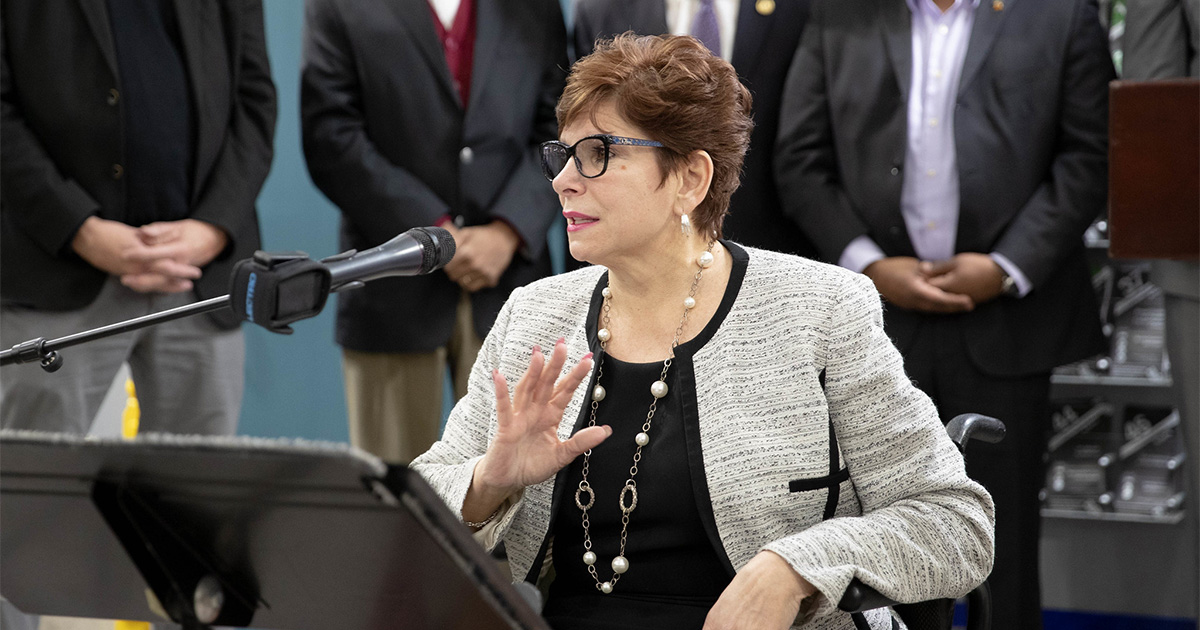
by Christin Brown | June 1, 2020 | News Releases, oped
On Monday, the Philadelphia Inquirer published the following opinion article by Senator Tartaglione in which she called for the immediate adoption of her Senate Bill 464 to strengthen workplace health and safety protections for state, county, and municipal employees, providing them with the same protections that all federal and private-sector employees already receive.
Pa. Capitol COVID disclosure issue underscores much-needed workplace protections for all | Opinion
By Christine Tartaglione
Amid a pandemic, the sharing of timely information is key to stopping the spread of illness.
That is why I was shocked to learn only through news media reports more than a week after the fact that a member of the Pennsylvania House of Representatives had tested positive for COVID-19. And I was appalled that the partisan leadership of the House chose not to notify, in a timely fashion, the member’s colleagues from opposing parties, his counterparts in the Senate, or the state employees whose jobs require them to be in the halls and offices of the Capitol during a pandemic.
Prompt and comprehensive notification could have and should have been conducted, but it was not. In light of these events, I renew my call for the General Assembly to immediately advance my legislation, Senate Bill 464, which would, for the first time, provide all public employees on the state and local levels with the same workplace health and safety protections enjoyed by all the nation’s federal and private-sector employees.
In his public statement Wednesday, the House member reported that he last visited the Capitol on May 14, was tested on May 18 after developing typical COVID-19 symptoms, and was confirmed positive on May 20.
The Centers for Disease Control and Prevention tells us that the incubation period for COVID-19 is 14 days. Therefore, by the time this member and his caucus notified the rest of us of a potential exposure, the virus could have been spread through the chain of social contacts to literally hundreds of individuals.
In subsequent public statements, the member’s caucus has reportedly cited health-care privacy laws for the decision to withhold this critical and potentially lifesaving information from people who were and are directly affected by it. However, the restrictions codified in the Health Insurance Portability and Accountability Act (HIPAA) apply only to health insurers, health-care clearinghouses, and health-care providers. They do not apply to employers.
The member personally stated that he kept quiet about his diagnosis “out of respect for my family, and those who I may have exposed.” Yet, I am quite certain that the people who he may have exposed would have very much appreciated a heads up about it.
More than that, being informed promptly about workplace health hazards should be their right.
Among many other provisions, SB 464 would require state and local public employers, including school districts, to “provide reasonable and adequate protection to the lives, safety or health of the employees.” Employers would have to notify employees of the confirmed presence of health hazards like COVID-19 in the workplace.
Further, the legislation would create the Pennsylvania Occupational Safety and Health Review Board to oversee and enforce its workplace health and safety requirements, including worker notification of the hazards that threaten them. Private and federal employers already furnish their employees with these protections.
As the spread of COVID-19 in Pennsylvania slows and businesses begin to reopen throughout the commonwealth, employers must keep workers informed about the risks that they face. If employers choose not to do that, then the law should mandate that they do so. Senate Bill 464 should receive consideration immediately — as should all employees.
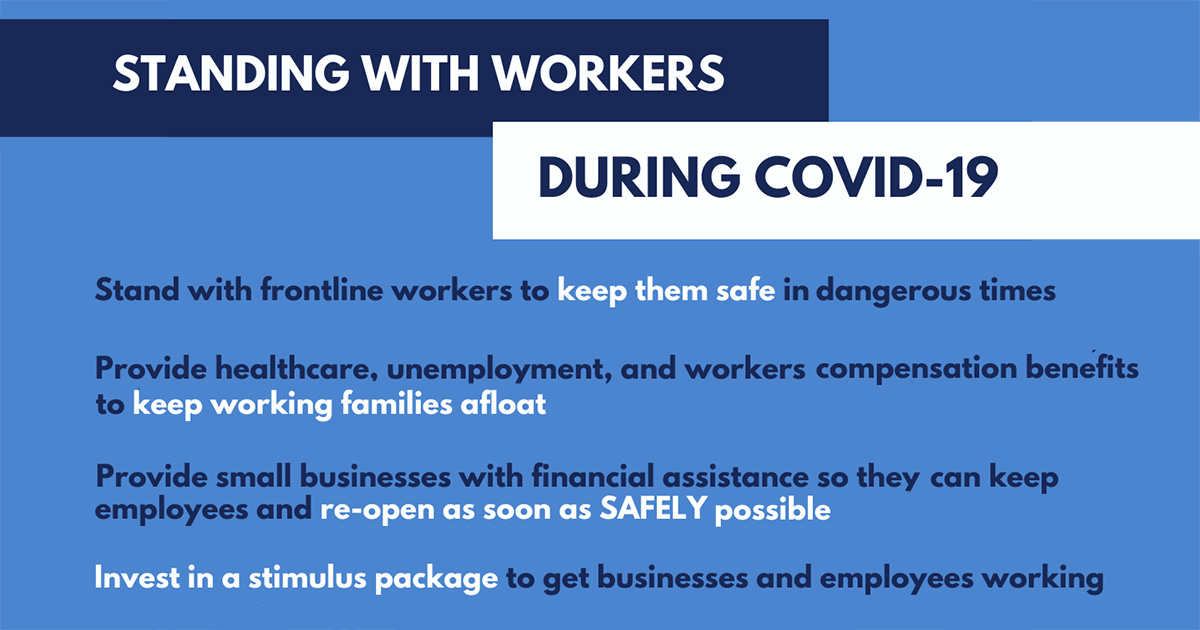
by Christin Brown | April 8, 2020 | News Releases
Harrisburg, PA − April 8, 2020 − The Senate adjourned Tuesday afternoon after the House Republicans indicated they would not be taking up Senate Bill 841, legislation that would have enabled local municipalities to hold their meetings remotely, permitted e-notary use; lengthened the time period a property tax payer can receive an early payment discount and delay penalties for late payments to Dec. 31st; and allowed businesses to make delayed payments on EITC. Another important amendment offered by Senator Pam Iovino (D-Allegheny) allowed school districts to renegotiate contracts to ensure contracted school workers can get paid and continue to receive benefits.
The amended SB 841 passed the Senate with bipartisan support. While the Senate Democrats and Republicans chose to put partisan difference aside, the House Republicans were pushing to please special interests and big donors. Intending to use this crisis as leverage, Speaker Turzai and his caucus passed legislation to prematurely allow businesses to reopen during this public health crisis and create a partisan task force to interfere with the Governor’s disaster response, both of which unnecessarily risk lives and threaten to expend the emergency.
“While the Governor and Department of Health Secretary offer leadership on public safety in daily briefings and Democratic members of the PA House and Senate draft legislation to protect working people who are either out of work or employed on the front lines of essential businesses, Republicans are putting lives at risk and undermining the Governor and Secretary Levine’s best efforts to end this crisis,” said Senate Democratic Leader Jay Costa, Jr. “Instead of taking the advice of our Health Secretary, they are trying to slow down our response and hasten the re-opening of non-essential businesses against the guidance of every public health entity in the country.”
The House Republicans were seeking even more egregious measures to provide civil immunity to big businesses, upend school districts ability to pay their teachers, and leave our corrections department employees at serious threat of the Coronavirus. Perhaps worst of all, the language does nothing to protect frontline workers, provide assistance to those that are out of work, or to help small businesses weather this crisis.
In an amendment to Senate Bill 327, House Republicans designed a task force with partisan appointees to usurp the Governor’s ability to rapidly respond to this quickly-evolving crisis. Their bill would require the Secretary of Health to leave PEMA, take hours away from public health crisis planning and defend her work in front of a redundant, political body.
The Senate Democratic Caucus will not support these bills. Alternatively, this caucus will be supporting legislation on the following issues:
- The American Working Family Relief Action Plan for front-line worker protections (Collett/L. Williams)
- Protecting workers during public health emergencies (Santarsiero)
- COVID-19 Food Worker Safety Act (Tartaglione)
- COVID-19 Grocery Store Worker Safety Act (Tartaglione)
- Payment of contract services in schools (Iovino)
- Childcare assistance (Schwank/L. Williams)
- Emergency expansion of the Family Medical Leave Act to provide paid sick leave (Farnese)
- Crisis grants for volunteer fire and EMS companies due to COVID-19 (Brewster)
- Require business interruption insurance to cover COVID-19 related business closures (Hughes)
- Eviction protection for all disaster emergencies (Farnese)
- Coronavirus disease and schools: allowing for online instruction (Dinniman)
- Creating a Common Wealth Fund to collect donations from individuals to provide for essential needs of those in need (AH Williams)
- Providing a presumption of eligibility for Workers’ Compensation benefits for workers that get sick in the workplace (Tartaglione)
- Ensuring receipt of a stimulus check from the Federal government is not included in an individual’s income for purposes of qualifying for social safety nets (Schwank)
- Exempting stimulus checks from the Federal government from State and local taxation (Brewster)
- Collaborating with financial institutions to mandate mortgage loan forgiveness, assistance to homeowners that were laid off due to state emergencies (Farnese)
“While many working Pennsylvanians are suffering from the COVID-19 pandemic, facing lost hours or even complete unemployment, others who find themselves in more fortunate circumstances have expressed a desire to help their fellow citizens by either donating to a local charity or patronizing local businesses,” said Senator Anthony H. Williams. “By establishing the “Pennsylvania Common Wealth” restricted account, taxpayers could redirect all or a portion of their stimulus check to the state, which in turn would be authorized to direct those funds into programs which help the neediest Pennsylvanians – property tax & rent rebates, temporary assistance for needy families, CHIP or medical assistance.”
“Pennsylvania needs solutions that help protect its working people who have been hit the hardest by the fallout of the coronavirus pandemic,” Senator Vincent Hughes said. “We in the Pennsylvania Senate Democratic Caucus have put forth a number of policy proposals that would do just that, meanwhile House Republicans have chosen to ignore these needs and push an agenda that jeopardizes public health and puts additional pressure on working people by delaying immediate relief. Our mission should be helping people in this unprecedented time of need and we will remain vigilant in protecting hardworking folks across the commonwealth.”
“As public servants, our most important duty is to protect the health, safety and welfare of our citizens. This includes making difficult decisions in challenging times. We all want businesses to reopen, employees back on the job, students back in classrooms and some semblance of normal life to resume, but that cannot happen unless we first continue mitigation efforts and follow the advice of our scientists and experts,” said Senator Wayne D. Fontana. “Anything contrary can set back progress and cause further harm on our economy and most importantly, on human health. The bipartisan legislation the Senate approved provides some necessary guidance and relief to local governments, businesses, school employees and property taxpayers during this unprecedented situation. It is unconscionable that House Republicans blatantly disregarded that duty and have chosen not to act.”
“The spread of coronavirus has not quieted the voice of special interests in Harrisburg and that’s tragic,” said Senator Larry Farnese. “Mitigation through isolation is working and we have to recognize that sacrifice through legislation that actually helps front-line workers instead of just saying nice things on social media.”
“This crisis and the Commonwealth’s response to the COVID-19 pandemic requires leadership, transparency and cooperation – not partisan politics,” said Senator John Blake. “While we’ve worked well with the Senate majority on real solutions that actually help people in this crisis, the House majority looks to undermine the executive authority of the Governor as well as the advice of medical and scientific experts regarding public health. I applaud the work being done by Governor Wolf and his administration to keep Pennsylvanians safe and to mitigate the spread of COVID-19. I will continue to support important legislation to help our business community, front-line workers and medical professionals; and to protect our citizens, schools and local governments across this state. We need to remain vigilant in following the recommendations of the PA Department of Health and the federal CDC.”
“Issues that the Commonwealth was already facing have been exacerbated by this pandemic, and child care services and early learning programs are near the top of the list. Childcare centers are teetering on the brink of insolvency, which is why part of our legislative package addresses early childhood learning and safe, quality childcare. We will not be able to restart Pennsylvania’s economy without this key component,” Senator Judy Schwank said. “Additionally, it’s vital that the income requirements of state programs like PACENET and Property Tax and Rent Rebate are adjusted so that Pennsylvanians receiving federal aid are not penalized later.”
“The key to an effective response to the pandemic is to ensure that our citizens are protected, health risks are addressed, and our economy restarts quickly,” Senator Jim Brewster said. “That’s why I introduced a six-point stimulus plan that will help small business, protect workers and create jobs once we are clear the threat posed by the pandemic. In addition, we need to make sure to address the immediate and long-term needs of first responders and all workers and businesses who are providing essential services during this time of extraordinary stress.”
“There is no segment of our Commonwealth that hasn’t been upended by this crisis. Everything is a priority. But in order to save livelihoods, we must first save lives,” said Senator Maria Collett. “As a nurse, I know firsthand the challenges our health care workers are up against and the urgency of passing legislation like the American Working Family Relief Action Plan for Front-Line Workers. Our doctors, nurses, first responders, senior care aides and others should not have to worry about getting sick or infecting others while performing their essential work.”
“It is irresponsible for the state to reopen businesses at the height of the COVID-19 outbreak. Those who are not essential workers should remain home,” said Senator Art Haywood. “We need to do all we can as legislators to support essential employees risking their lives on a daily basis,” said Senator Haywood (D-Montgomery/Philadelphia). “I will continue to support the work Governor Wolf and Secretary Levine have done to inform the public to remain safe and stay home.”
“The citizens of Pennsylvania are counting on their elected representatives to save lives by responding swiftly, pragmatically, and in a bipartisan manner to slow the spread of this highly contagious virus,” said Senator Pam Iovino. “To fulfill our duty to the public, we must follow the consensus guidance of public health professionals, focus on protecting front-line essential workers, and put in place protections that allow furloughed or unemployed workers and small businesses to weather the economic disruption.”
“As the Democratic chair of the Local Government Committee, I worked with stakeholders for weeks to craft the provisions of SB 841, I am disappointed these commonsense measures, which passed the Senate with bipartisan support, are being held up by House Republicans for little reason,” said Senator Tim Kearney. “The House should immediately pass SB 841 and focus on bringing relief to Pennsylvanians, rather than sabotaging the Governor’s efforts to keep our families safe.”
“Yesterday, the majority party in both chambers failed to use their legislative power, where they can literally pass any bill they want to, and instead decided to pack up and go home without,” said Senator Katie Muth. “Failing to pass meaningful bills when people are fighting for their lives is simply negligent.”
“Now is not the time to play politics,” said Senator Steve Santarsiero. “Saving lives has to be the first priority. In order to do that, we must all do our part and follow the Governor’s and Department of Health’s plans as they’ve been explained to us countless times. SB 841 is just one of many ways our caucus has worked in a bipartisan effort to provide relief to those who need it most. However, SB 327 is exactly what our healthcare professionals warn us against. Promoting a premature return to normalcy will only undermine our effort to keep the public safe, and further endanger thousands of lives.”
“Government’s most important role is the protection of its people. Since the COVID-19 crisis the Senate has met three times, with little to show for it. Communities across the commonwealth have no interest in the paralysis of government especially in the most desperate of times. What they do care about is the protection of our essential workforce, the interruption of our small businesses, job loss, staying in their homes and educating their children. The only thing that matters is the preservation and protection of every resource needed to keep families safe during this health crisis,” said Senator Sharif Street.
“We need to be back in Harrisburg, we need to get back to work. We must work together to ensure our communities are protected during uncertain times.”
“As thousands of Pennsylvanians continue to get sick and hundreds die, now is no time to play partisan politics,” Senator Tina Tartaglione said. “As public leaders, we must unite behind the common goal of reducing the threat of this virus and mitigating the harm being done to our constituents. The package of bills we have proposed will directly help all Pennsylvania families, including essential workers, displaced workers, first responders, school children, those who have become sick, and those in need. I urge all legislators from all political parties to support these bills.”
“Stopping the spread of COVID-19 and saving lives is our top priority. We also need to protect and support our constituents, our communities, and our businesses,” said Senator Lindsey Williams. “Our front-line essential workers – our hospital workers, grocery store workers, emergency service personnel and others – cannot afford to wait for PPE. They needed it weeks ago. Our childcare facilities need our help to stay open and provide care to the children of our essential workers while they risk their lives for us. Our small businesses need financial support to stay afloat. Our municipalities need the ability to meet remotely and make decisions that will ensure the safety of all of residents. There are a lot of needs right now and our constituents do not have time for us to waste playing partisan games or naming bridges. The Senate Democrats have offered concrete solutions that will help people. We should all be working together to get them to the Governor’s desk for signature as soon as possible.”
More information on the work of the Pennsylvania Senate Democratic Caucus during the COVID-19 crisis can be found at pasenate.com/covid19.
###

by Christin Brown | March 26, 2020 | News Releases
Philadelphia, PA, March 26, 2020 – State Senator Christine Tartaglione (D-Philadelphia) advises Pennsylvanians who are seeking to maintain or enter outpatient drug and alcohol recovery programs during the COVID-19 emergency that help is available to them through online and telephone-based counseling services and meetings.
“At this difficult time for all Pennsylvanians, it is imperative that we as a community redouble our efforts to support those among us who struggle with substance use disorder and those in recovery,” Senator Tartaglione said. “I am pleased to report that the Commonwealth’s Department of Drug and Alcohol Programs, as well as many private-sector programs are acting to mitigate the new challenges created by the coronavirus pandemic.”
While Pennsylvania remains under the disaster emergency declared by Governor Tom Wolf on March 6, all designated Single County Authorities that have received grant funding from the Department of Drug and Alcohol Programs for outpatient substance use disorder services may use those funds to provide counseling and other clinical services using telehealth technology.
Qualified counselors may provide telehealth using real-time, two-way interactive audio-video transmission services in licensed Drug and Alcohol Outpatient clinics. While the two-way interactive transmission is the preferred method, services provided by telephone and in the home are also acceptable.
For further information from the Department of Drug and Alcohol Programs, visit: https://www.ddap.pa.gov/pages/default.aspx
In addition, numerous Alcoholics Anonymous and Narcotics Anonymous groups are conducting meetings online and via teleconferencing. The following links provide information for online Alcohol Anonymous groups:
In addition, the following links provide information for online Narcotics Anonymous groups:
# # #
If you would like more information about this topic, please contact William Kenny at 215-533-0440 or William.Kenny@pasenate.com.

by Christin Brown | March 18, 2020 | News Releases
The Commonwealth Financing Agency has transferred additional funding into the Small Business First program to support low interest working capital loans.
Philadelphia, PA, March 18, 2020 – State Senator Christine Tartaglione (D-Philadelphia) is advising Pennsylvania small businesses that they may be eligible for low interest loans of up to $100,000 to fulfill their working capital needs during the COVID-19/coronavirus emergency.
The Commonwealth Financing Agency (CFA) has transferred $40 million into the Small Business First (SBF) program administered by the Pennsylvania Industrial Development Authority (PIDA). This funding will be combined with $21 million from PIDA’s own resources for a total of $61 million in additional SBF funding.
“Small businesses are bearing a tremendous burden during the coronavirus emergency as they have been asked to reduce or suspend their non-essential operations and as Pennsylvania consumers have been advised to practice social distancing,” Senator Tartaglione said. “These loans will help small businesses pay their bills and keep the lights on until this public health crisis subsides.”
CFA moved $40 million from PIDA’s Machinery and Equipment Loan Fund to SBF with the support of the four caucuses of the Pennsylvania General Assembly and Governor Tom Wolf. These funds will be used to award working capital loans of up to $100,000 to businesses that employ 100 or fewer people. The current interest rate is 3.0% but the PIDA board is empowered to modify the rate.
SBF is the most logical program to assist small businesses quickly because this is already its intended purpose. It has the structure and regional infrastructure to help small businesses immediately, including partnerships with local Certified Economic Development Organizations (CEDOs) that help businesses prepare and submit applications to PIDA. As these loans have a maximum amount of $100,000, they can be approved by PIDA staff in a timely fashion providing that all application requirements are satisfied.
Information about Small Business First and other PIDA programs is available via https://dced.pa.gov/programs/pennsylvania-industrial-development-authority-pida/
# # #
If you would like more information about this topic, please contact William Kenny at 215-533-0440 or William.Kenny@pasenate.com.
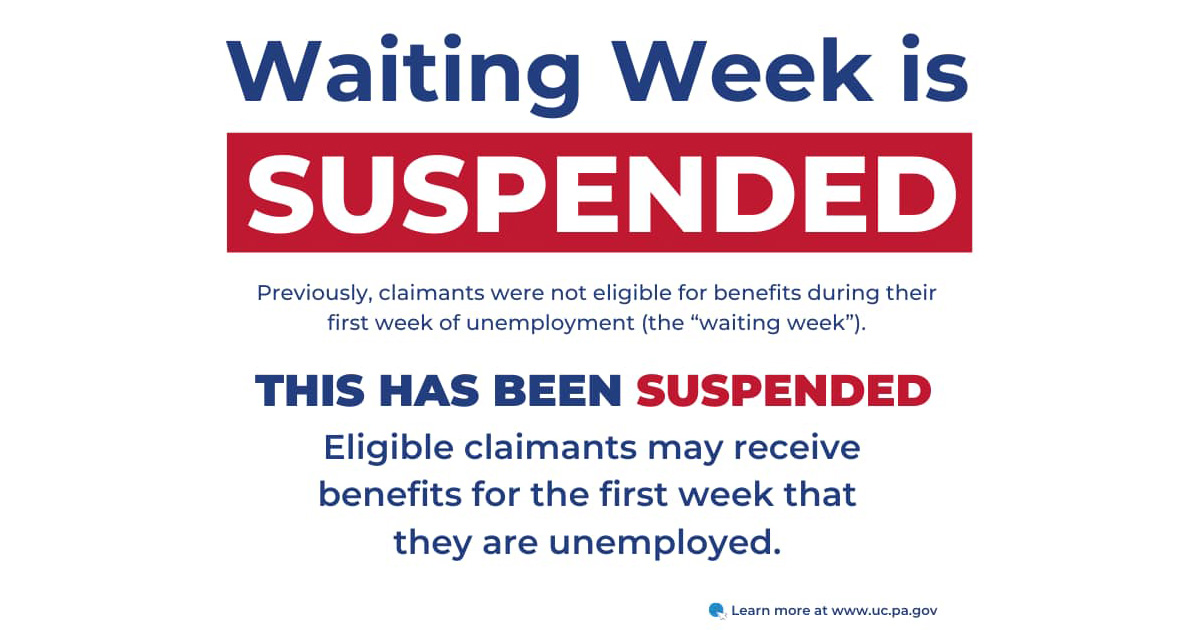
by Christin Brown | March 17, 2020 | News Releases
Provisions of Pennsylvania’s Unemployment Compensation Law will be relaxed for the duration of the COVID-19 Emergency to help workers displaced by the pandemic
Philadelphia, PA, March 17, 2020 – State Senator Christine Tartaglione (D-Philadelphia) welcomes Governor Tom Wolf’s directive to relax the waiting period, work registration, and work search requirements for Pennsylvanians who claim unemployment compensation benefits during the COVID-19 (coronavirus disease) pandemic.
Wolf has instructed the Department of Labor & Industry to suspend the waiting-week requirement in Section 401(e) of Pennsylvania’s Unemployment Compensation Law. As a result, the first week of a worker’s unemployment will be compensable. This suspension will remain in effect for the duration of the governor’s disaster emergency declaration for COVID-19.
The governor has also directed the department to suspend the work registration and search requirements. These measures will also remain in effect for the duration of the disaster emergency.
“As businesses throughout the Commonwealth make the difficult but necessary decision to close or reduce their operations temporarily in response to the public health emergency, many workers find themselves suddenly without income and wondering how they will pay their bills,” Senator Tartaglione said. “The measures initiated by the governor will allow these Pennsylvanians to collect unemployment compensation sooner and help them to protect their financial wellbeing as well as their physical health.”
Pennsylvania’s Unemployment Compensation Law allows for employers to be relieved of charges for compensation once there has been a federal disaster declaration under the Stafford Act and the individual claimants would have been eligible for Disaster Unemployment Assistance. Therefore, an employer may be relieved from charges for compensation paid to an individual with respect to any week of unemployment occurring due to COVID-19.
The Unemployment Compensation website offers up-to-date information for workers impacted by COVID-19. Workers may be eligible for compensation should the employer close temporarily or permanently or should the employee experience a reduction in hours. Displaced workers may apply for compensation online.
# # #
If you would like more information about this topic, please contact William Kenny at 215-533-0440 or William.Kenny@pasenate.com.

 “Americans continue to get vaccinated in record numbers, but many folks and many communities remain underserved due to a variety of factors. Our goal today was to make it easy and convenient for residents of areas that have been hardest-hit by the pandemic to receive the medical care they deserve,” Senator Tartaglione said. “I thank Lehigh Pharmacy and The Baptist Worship Center for making this event possible.”
“Americans continue to get vaccinated in record numbers, but many folks and many communities remain underserved due to a variety of factors. Our goal today was to make it easy and convenient for residents of areas that have been hardest-hit by the pandemic to receive the medical care they deserve,” Senator Tartaglione said. “I thank Lehigh Pharmacy and The Baptist Worship Center for making this event possible.” Lehigh Pharmacy, an independent pharmacy at 1006 W. Lehigh Ave. in North Philadelphia, administered all vaccinations by appointment in accordance with the latest city and state eligibility policies, as well as COVID mitigation guidance provided by the Centers for Disease Control. Vaccines are now available to anyone 16 or older. Contact Lehigh Pharmacy at 215-225-7522 for information about getting vaccinated.
Lehigh Pharmacy, an independent pharmacy at 1006 W. Lehigh Ave. in North Philadelphia, administered all vaccinations by appointment in accordance with the latest city and state eligibility policies, as well as COVID mitigation guidance provided by the Centers for Disease Control. Vaccines are now available to anyone 16 or older. Contact Lehigh Pharmacy at 215-225-7522 for information about getting vaccinated.

